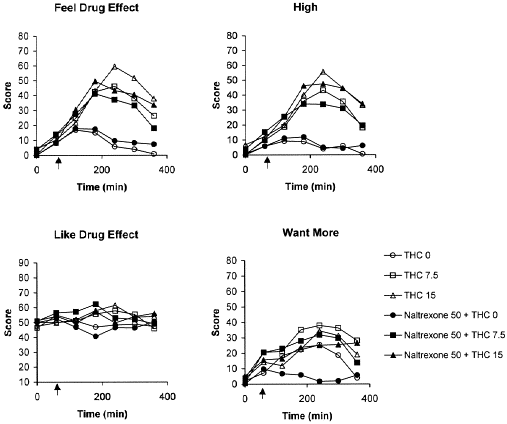|
Will Naltrexrone inhibit THC binding?
| Q: |
I have searched far and wide for information pertaining to the use of Naltrexone as an inhibitor of THC and have come up with nothing. In my search I have found all the common uses of Naltrexone and I'm lead to believe that since marijuana and it's active chemicals are not opiates that Naltrexone would not inhibit the affects THC.
Am I correct in this assumption? Do you know where I could find any information on research done on this topic?
|
|
| A: |
Naltraxone is a powerful opiate antagonist that is commonly used to treat overdoses of opiates. As far as I know, it is only effective in binding to and blocking the opiate receptors (and most likely a specific subtype of those). I believe your assumption is correct, that because the active parts in cannabis (the cannabinoids) are not the same nor even closely related to opiates, then Naltrexone should have no effect on cannabinoid binding and activity.
If you are up to the challenge of wading through the jargon, a good resource for looking up such specific biomedical questions is Medline. It indexes many medical, biological, pharmalogical, behavioral, and other health-related journals. PubMed is a free interface for Medline provided by the National Institute of Health. Sometimes you can gather the information you need from the summaries/abstracts of the articles, but often you may need to look up the journal article in a library that would have it (such as a University library). A good University Research Librarian can be and often are a lot of help in finding the articles. Understanding them is a whole other ballgame.
A quick search revealed the following extremely relevant reference:
aloha,
psilo
While a single paper on a topic should never be taken as the final word, the double blind crossover design is a good one and its findings are fairly clear. Here's a short quote from the paper's abstract (a short summary):
THC increased heart rate and self-reported drug effects, such as euphoria and marijuana-like effects, and decreased psychomotor performance. Naltrexone increased heart rate and decreased self-reported measures of vigor and hunger but did not alter any of the effects of THC. These results suggest that the subjective, physiological, and behavioral effects of THC in humans are not mediated through opioid systems.
Looking at one of the graphs from the paper, the graphs of "High" and "Feel Drug Effect" clearly show that the individuals did not find the Naltrexone blocked their experience of the THC. The lines with the solid triangles and and solid squares in the images are the ones where the people received THC + Naltrexone and these are not that much differenct from the open square and open triangle lines where they received THC and no naltrexone.

Fig. 1. Subjects' responses on the Drug Effects Questionnaire (DEQ). Responses were recorded on 100-mm VAS scales. Naltrexone (50 mg) was administered at time 0 min. THC (0, 7.5 or 15 mg) was administered at the arrow (60 min after naltrexone). Data points represent the mean (n=14) at each time point. Error bars have been omitted for clarity.
I hope that helps answer your question.
take care,
earth |
|
|
|
|
|
Categories:
[ Opiates ]
[ Cannabis ]
|
|



